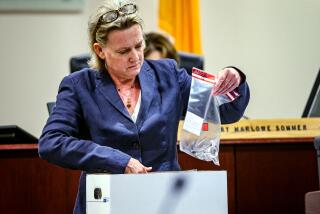Judge Urged to Bar Testimony on Evidence Planting
- Share via
Lawyers pressing a civil suit against O.J. Simpson on Tuesday asked a Superior Court judge to block jurors from hearing any testimony about evidence planting, continuing their assault on the defense theory that police planted a glove, blood and socks to frame the former football star for murder.
“It is time for the court to end this long-running charade,” attorney Peter Gelblum, who represents Fred Goldman, wrote in a motion filed Tuesday. “Defendant’s ‘evidence’ is not--and never has been--sufficient to permit him to make the highly charged, inflammatory, confusing, time-consuming and ultimately absurd argument” that a network of corrupt police personnel framed him for the June 12, 1994, murders of Nicole Brown Simpson and Ronald Goldman.
Superior Court Judge Hiroshi Fujisaki ruled last month that Simpson’s team would not be allowed to introduce the planting theory unless they could come up with specific facts to back it up. The defense attempted to meet Fujisaki’s criteria by submitting a stack of supporting facts Sept. 23. But in their motion, the plaintiffs rejected the defense response as inadequate and called on Fujisaki to make good on his threat to exclude all references to evidence planting.
“Defendant has now had every conceivable opportunity to produce evidence to support these theories, and it is clear that he does not have any such evidence,” Gelblum wrote. Arguing that simply mentioning the theory would unfairly bias jurors, he added: “for a substantial number of jurors, the mere allegation of police misconduct resonates so loudly that it overwhelms all other evidence in the case.”
In their filings, Simpson’s lawyers in the civil case backed up their allegations of evidence planting by listing a litany of circumstances they considered suspicious.
They questioned why nobody noticed until weeks after the murders a blood spot on the back gate of Nicole Simpson’s condominium or blood splotches on the dark dress socks recovered from the foot of Simpson’s bed. They also pointed out that Simpson’s Bronco--found to contain blood matching the genetic makeup of the two victims--was not well secured and could have been tampered with.
And most important, they argued that former Los Angeles police Det. Mark Fuhrman, who used racial epithets and boasted of misconduct in taped interviews with a screenwriter, had the motive and opportunity to drop a bloody glove behind Simpson’s guest house to frame him.
Simpson’s defense team in the criminal trial successfully used many of the same arguments. But the plaintiffs have strenuously objected to raising those theories again in the civil trial, complaining that the argument is too far-fetched, inflammatory and vague to be admitted as evidence.
Admitting the planting theory, Gelblum argued, “will create a substantial danger of undue prejudice, confusing the issues, and misleading the jury.”
Throughout the ongoing jury selection process, dozens of jurors have indicated that they believe a police frame-up is at least possible, and many strongly believe that unknown conspirators planted evidence against Simpson.
They recall so many details from the criminal trial that some analysts believe they may not be swayed from their belief about a frame-up even if the defense is barred from raising allegations of evidence planting.
“So many jurors in the civil case have been exposed to this type of argument from the criminal case that the judge’s ruling may not have as much of an impact as it might have in a normal civil case,” said UCLA law professor Peter Arenella, who has studied both Simpson trials.
More to Read
Sign up for Essential California
The most important California stories and recommendations in your inbox every morning.
You may occasionally receive promotional content from the Los Angeles Times.













